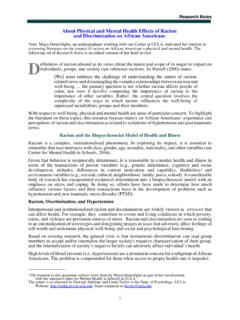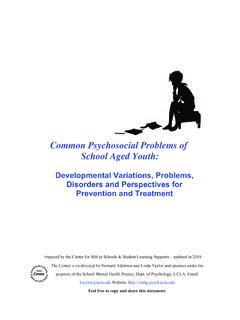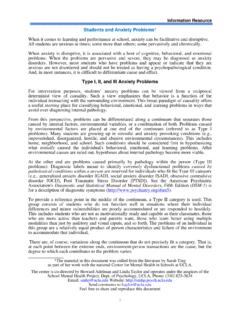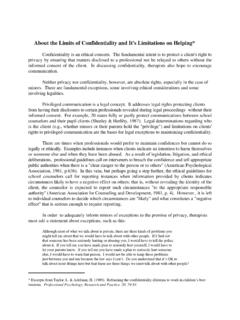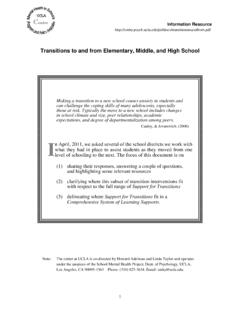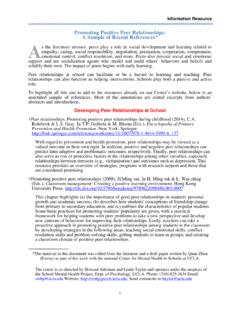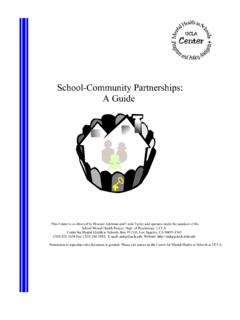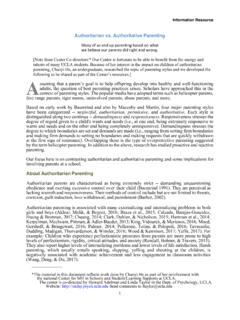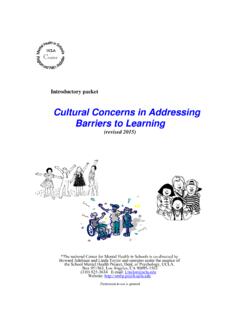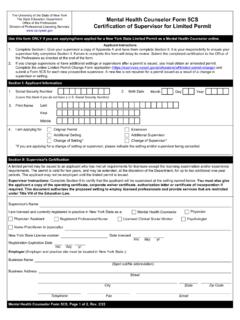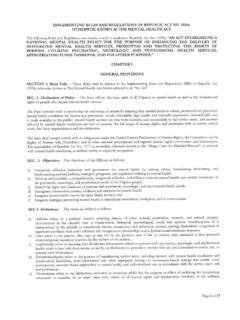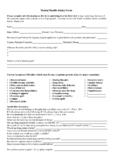Transcription of Confidentiality and Informed Consent - UCLA School …
1 Introductory Packet Confidentiality and Informed ConsentI know it may be hard to talk about things that upset and worry make it easier, I want you to know that most of what we talk aboutis private - just between the two of us. For instance, if you are feelingvery sad or scared, it may help just to talk about how you feel. It willbe safe for you to tell me about such feelings because I won t tellanyone what you said. Sometimes people feel very guilty aboutsomething they did and feel they can t tell anyone about it. We can talkabout such things without anyone else knowing. Do you understandthat it s OK to talk about most things here? This Center is co-directed by Howard Adelman and Linda Taylor and operates under the auspice of the School mental health Project, Dept. of Psychology, : Center for mental health in Schools, Box 951563, Los Angeles, CA 90095-1563: (310) 825-3634 E-mail: Website: (Revised 2015)Children and Adolescents: Confidentiality and Consent AND ASSENT?
2 In August 2015, an online exchange among members of the American PsychologicalAssociation focused in on the matter of child and adolescent assent after parents or legalguardians have given Informed Consent . Here is one psychologist s take on the matter of assent. * I know very few psychologists who have tried to formalize their assentprocedures, with the presumed thinking being that if Consent is obtained fromparents or legal guardians, then assent is nice but not necessary (just icing on thecake). However, this is not my take of what the APA Ethical Principles has to sayabout assent (see below), and as such I have tried to formalize the assentprocedures we use in our practice. What I have found is that the real trick ismaking assent procedures developmentally appropriate for the target audience. We have developed both child and adolescent versions of assent documents ..,and will use these whenever it is developmentally/cognitively appropriate to doso.
3 However, when not developmentally appropriate we will still cover the assentinformation as best we can in verbal form and then document in the progress notethat assent procedures were reviewed with the client. We also let parents take alook at these assent docs to see how we are explaining things to their kids. I amnot holding up our assent practices as any sort of gold standard, but here they arein case others would like to borrow from them. I would also love to see whatothers are doing about assent in their practices and clinics. *D. Scott Herrmann, , ABPP , Licensed Psychologist, Board Certified Diplomate in Child &Adolescent Psychology, Arizona Child Psychology, APA Ethical Informed Consent (a) When psychologists conduct research or provide assessment, therapy, counselingor consulting services in person or via electronic transmission or other forms ofcommunication, they obtain the Informed Consent of the individual or individuals usinglanguage that is reasonably understandable to that person or persons except whenconducting such activities without Consent is mandated by law or governmentalregulation or as otherwise provided in this Ethics Code.
4 (See also Standards , Informed Consent to Research; , Informed Consent in Assessments; and , Informed Consent to Therapy.)(b) For persons who are legally incapable of giving Informed Consent , psychologistsnevertheless (1) provide an appropriate explanation, (2) seek the individual's assent, (3)consider such persons' preferences and best interests, and (4) obtain appropriatepermission from a legally authorized person, if such substitute Consent is permitted orrequired by law. When Consent by a legally authorized person is not permitted orrequired by law, psychologists take reasonable steps to protect the individual's rights Packet Confidentiality and Informed Consent Introduction I. The BasicsA. Overview: What is it all about and why is it important?Understanding Confidentiality & minor 2B. What is special about Confidentiality when you work with children and adolescents?
5 1. Reasons for protecting the privacy of children and Involving Parents in 9C. Dilemmas in Confidentiality in working with children and adolescents1. Limitsa. Fact Limits to Confidentiality for the teacher and 142. How to address Confidentiality dilemmas and share information appropriatelya. A brief discussion of the Confidentiality A brief discussion of minor 20c. Who should know what? Confidentiality and information sharing in service 23d. Critical issue: Addressing Confidentiality concerns is School -linked integrated service 29II Policy Regarding ConfidentialityA. Policy / Law / Ethics1. health Information Portability and Accountability Act (HIPAA).. 352. Information Sharing and the Family Education Rights and Privacy 393. What Parents Need to Know About Department of Education Professional Association Policy Statements1.
6 American Academy of Social Workers Association of America Resolution on American School counselor JAMA Editorial: Limiting Confidentiality of Adolescent health Services: What are the Risks?..56 III Guidelines and Models A. Models for dealing with Confidentiality and Informed 60B. Guidelines for protecting confidential student health Documentation of psychotherapy by 85D. Protocol for handling issues of Confidentiality in public 92E. Protecting the privacy of students 95F. Confidentiality in School : Do You Know What to Do?.. 99IV Additional ResourcesA. Agencies, Advocacy Groups and Other Related Resources Produced by Our 1052I. The Basics A. Overview: What is it all about and why is it important?Understanding Confidentiality & Minor Consent B. What is special about Confidentiality when you work with children and adolescents?1. Reasons for Protecting the Privacy of Children and Parents in CounselingC.
7 Dilemmas in Confidentiality in working with children and adolescents 1. Limitsa. Fact Sheetb. Limits to Confidentiality for the teacher and to address Confidentiality dilemmas and share information appropriatelya. A Brief Discussion of the Confidentiality Brief Discussion of Minor should know what? Confidentiality and information sharing in Issue: Addressing Confidentiality concerns in School -linked integratedservice efforts3I. The BasicsA. Overview: What is it all about and why is it important?Understanding Confidentiality & Minor Consent * Excerpts from: Taylor, L. & Adelman, the Confidentiality dilemma to work in children s best interests. Professional Psychology: Research & Practice, 20, 's_best_interestsConfidentiality is an ethical concern. The fundamental intent is to protect a client's right to privacy byensuring that matters disclosed to a professional not be relayed to others without the Informed consentof the client.
8 In discussing Confidentiality , therapists also hope to encourage communication. Neither privacy nor Confidentiality , however, are absolute rights, especially in the case of minors. Thereare fundamental exceptions, some involving ethical considerations and some involving communication is a legal concept. It addresses legal rights protecting clients from havingtheir disclosures to certain professionals revealed during legal proceedings without their informedconsent. Legal determinations regarding who is the client ( , whether minors or their parents holdthe "privilege") and limitations on clients' rights to privileged communication are the bases for legalexceptions to maintaining are times when professionals would prefer to maintain confidences but cannot do so legally orethically. Examples include instances when clients indicate an intention to harm themselves or someoneelse and when they have been abused.
9 As a result of legislation, litigation, and ethical deliberations,professional guidelines call on interveners to breach the confidence and tell appropriate publicauthorities when there is a "clear danger to the person or to others" (American PsychologicalAssociation). In this vein, but perhaps going a step further, the ethical guidelines for School counselorscall for reporting instances when information provided by clients indicates circumstances likely to havea negative effect on others; that is, without revealing the identity of the client, the counselor is expectedto report such circumstances "to the appropriate responsible authority" (American Association forCounseling and Development). However , it is left to individual counselors to decide whichcircumstances are "likely" and what constitutes a "negative effect" that is serious enough to order to adequately inform minors of exceptions to the promise of privacy, therapistsmust add a statement about exceptions, such as this:Although most of what we talk about is private, there are three kinds of problems you might tell me about that we would have to talk about with other people.
10 If I find out that someone hasbeen seriously hurting or abusing you, I would have to tell thepolice about it. If you tell me you have made plan to seriouslyhurt yourself, I would have to let your parents know. If you tellme you have made a plan to seriously hurt someone else, I wouldhave to warn that person. I would not be able to keep theseproblems just between you and me because the law says I can you understand that it s OK to talk about most things here butthat these are three things we must talk about with other people?4 Fortunately, most of what we talk over is private. If you want to talk about any ofthe three problems that must be shared with others, we ll also talk about the bestway for us to talk about the problem with others. I want to be sure I m doing thebest I can to help youngsters may feel a bit overwhelmed about the exceptions to privacy and the serious problemsdescribed, they may simply nod their acquiescence or indicate that they are unsure about how to soften the impact, therapists may add statements, such as this:States vary in the degree to which their laws specify limitations on privileged communication betweencounseling professionals and minor clients.
